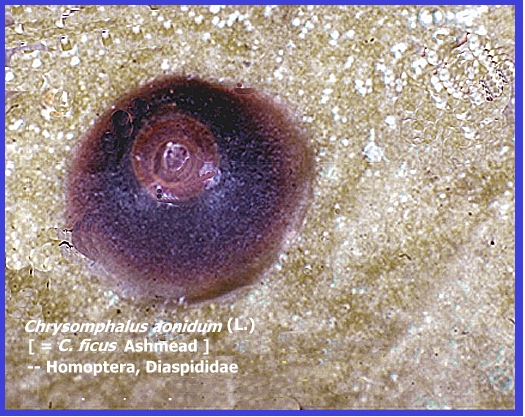FILE: <ch-52.htm> GENERAL INDEX
[Navigate to
MAIN MENU ]
|
FLORIDA RED SCALE Chrysomphalus aonidum (L.) [= ficus Ashmead]--Diaspididae (Contacts) ---- CLICK on Photo to enlarge & search for Subject Matter with Ctrl/F. GO TO ALL: Bio-Control Cases
The introduction of
natural enemies began in Israel in 1945-1947 with Comperiella bifasciata
from California. Although this
introduction failed, further efforts in 1956-1957 resulted in the
establishment of two parasitoids, Aphytis
holoxanthus (<150
released) and Pteroptrix (= Casca) smithi (Compere) (ca. 120 released) from Hong Kong (Rivnay
1968). Interestingly, P. smithi was not recovered in the field until 1960. Complete biological control resulted
within 2-3 years along coastal Israel, primarily because of the rapid natural
dispersal of A. holoxanthus (Rivnay 1968,
DeBach et al. 1971). Pteroptrix smithi later dispersed along the coastal plain, and
although its activity was thought to be complementary to A. holoxanthus,
later studies by Steinberg et al. (1986) showed it to be a dominant
species. This project was so
successful that it stimulated a sound integrated control program in citrus in
Israel (Harpaz & Rosen 1971). Aphytis holoxanthus was
then established in Mexico, Florida, South Africa, Australia and Texas, where
complete biological control was also achieved (Maltby et al. 1968, Selhime et
al. 1969, Cilliers 1971, Smith 1978b, Annecke & Moran 1982, Dean
1982). Additional information
pertaining to this project and biologies of hosts and natural enemies may be
found in the following (Dean 1955, Dean & Bailey 1960, Cohen & Nadel
1962, Clancy et al. 1963, Broodryk 1964, Flanders 1964, 1966; Quednau 1964,
Rosen 1965, 1967; Muma & Selhime 1967, Bedford 1968, Jimenez-Jimenez
1968). REFERENCES: [Additional references may be found at: MELVYL
Library ] Annecke, D. P. & V. C. Moran. 1982.
Insects and Mites of cultivated plants in South Africa. Butterworth & Co., South Africa. 383 p. Bedford, E. C.
G. 1968. The biological
control of red scale, Aonidiella
aurantii (Mask.), on citrus
on South Africa. Ent. Soc. So. Africa
J. 31: 1-15. Bodenheimer,
F. S. 1951. Citrus Entomology
in the Middle East. W. Junk, Publ.,
The Hague. 663 p. Broodryk, S. W. 1964. Biological
control of circular purple scale. So.
Africa Citrus J. 372: 7, 9, 11. Cilliers, C. J. 1971. Observations on
circular purple scale Chrysomphalus
aonidum (Linn.), and two
introduced parasites in Western Transvaal citrus orchards. Entomophaga 16: 269-84. Clancy, D.
W., A. G. Selhime & M. H. Muma. 1963.
Establishment of Aphytis
holoxanthus as a parasite of
Florida red scale in Florida. J. Econ.
Ent. 56: 603-05. Cohen, I.
& D. Nadel. 1962.
The Institute of Biological Control of Citrus Pests. Citrus Market. Bd. Israel, Agrotech.
Div. 24 p. Dean, H. A.
1955. Factors affecting
biological control of scale insects on citrus. J. Econ. Ent. 48:
444-47. Dean, H. A.
1982. Reduced pest status of
the Florida red scale on Texas citrus associated with Aphytis holoxanthus. J. Econ. Ent. 75: 147-49. Dean, H. A. & J. C. Bailey. 1960.
Introduction of beneficial insects for the control of citrus scale
insects and mites. Rio Grande
Val. Hort. Soc.
J. 14: 40-6. DeBach, P.
1971. Fortuitous biological
control from ecesis of natural enemies.
In: Entomological Essays to Commemorate the
Retirement of Professor K. Yasumatsu.
Hokuryukan Publ. Co., Tokyo.
389 p. Ebeling, W.
1959. Subtropical Fruit
Pests. Univ. Calif. Div. Agric.
Sci. 436 p. Flanders, S. E. 1964. Some biological
control aspects of taxonomy exemplified by the genus Aphytis (Hymenoptera: Aphelinidae). Canad. Ent. 96: 888-93. Flanders, S. E. 1966. Unique biological
aspects of the genus Casca
and a description of a new species. Ann. Ent. Soc.
Amer. 59: 79-82. Harpaz, I. & D. Rosen. 1971.
Development of integrated control programs for crop pests in
Israel. In: C. B. Huffaker
(ed.), Biological Control. Chapter
20. Plenum Press, New York, London. Jimenez-Jimenez,
E. 1968. Comportamiento de Aphytis
holoxanthus DeBach en
México. Fitofilo 20:
42-8. Kennett, C. E., J. A. McMurtry & J. W.
Beardsley. 1999. Biological control in subtropical and
tropical crops. In: Bellows, T. S. & T. W. Fisher (eds.), Handbook of Biological Control: Principles and Applications. Academic Press, San Diego, New York. 1046 p Maltby, W.
L., E. Jimenez Jimenez & P. DeBach.
1968. Biological control of armored scale
insects in Mexico. J. Econ.
Ent. 61: 1086-88. Muma, M. H.
& A. G. Selhime. 1967. Aphytis Howard (Hymenoptera:
Eulophidae) on Florida citrus. Fla.
State Hort. Soc. Proc. (1966) 79:
86-91. Quayle, H. J.
1938. Insects of Citrus and
Other Subtropical Fruits. Comstock
Publishing Co., Ithaca, New York. 583 p. Quednau, F.
W. 1964. A contribution on
the genus Aphytis Howard in
South Africa (Hymenoptera: Aphelinidae).
Ent. Soc. So. Africa J. 27:
86-116. Rivnay, E.
1968. Biological control of
pests in Israel (a review 1905-1965).
Israel J. Ent. 3: 1-156. Rosen, D.
1965. The hymenopterous
parasites of citrus armored scales in Israel (Hymenoptera:
Chalcidoidea). Ann. Ent. Soc.
Amer. 58: 388-96. Rosen, D.
1967. Biological and
integrated control of citrus pests in Israel. J. Econ. Ent. 60:
1422-27. Selhime, A.
G., M. H. Muma, W. A. Simanton & C. W. McCoy. 1969. Control of Florida red scale in Florida
with the parasite Aphytis holoxanthus. J. Econ. Ent. 62: 954-55. Smith, D.
1978b. Biological control of
scale insects on citrus in southeastern Queensland. II. Control of circular
black scale Chrysomphalus ficus Ashmead, by the
introduced parasite, Aphytis
holoxanthus DeBach. J. Aust. Ent. Soc. 73: 373-77. Steinberg, S.,
H. Podoler & D. Rosen. 1986.
Biological control of the Florida red scale, Chrysomphalus aonidum
(L.) in Israel by two parasite species:
Current status in the coastal plain.
Phytoparasitica 14: 199-204. |
